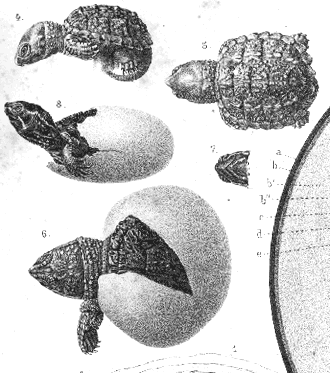A Gift of Turtle Eggs
For a Spanish language version of this episode, Click Here.
Today, a young biology teacher delivers a pail of turtle eggs. The University of Houston's College of Engineering presents this series about the machines that make our civilization run, and the people whose ingenuity created them.
My son recently picked up a 1916 volume of Atlantic Monthly articles for me. One tells how its author, Dallas Sharp, made his own old-book discovery on a dusty library shelf. He ran across Louis Agassiz's four-volume Natural History, finished in 1862.
That monumental treatise begins with acknowledgments. So Sharp traces names of people who'd helped Agassiz: the Rev. Zadok Thompson of Burlington, Mr. J. Jenks of Middleboro, and -- Henry David Thoreau! Thoreau's just one more name on a long list of people who slavishly combed the woods to supply Agassiz with turtles.
Sharp is struck by that. "With every human being is a possible book," he says. "Is it not amazing that the books of men are so few? and so stupid!" Agassiz's turtles are all right, but how much more are the stories behind the acknowledgments.
Sharp knows one of those stories. Mr. J. Jenks of Middleboro had once been his biology teacher. Jenks had told Sharp how he collected turtle eggs for Agassiz.
One day Agassiz walked into the academy where Jenks taught. "I need turtle eggs within three hours of their birth," the imperial Agassiz announced. Harvard was 40 miles away, but if young Jenks could meet that regal demand, it would be a badge of triumph.
Off to a forest pond he went. He stalked turtles for a month. Then one day, by the early mists of dawn, a great pregnant turtle lumbered down to the sandy shore and laid eggs. Jenks packed them with sand in a bucket. He mounted his horse, and -- like some latter-day Paul Revere -- set off to the train station.
But wait! This was Sunday! No train to rely on today. So he turned his horse toward Boston. Halfway there, losing time, he did see a train. He planted his horse on the tracks and forced the engine to a halt. "Eggs for Agassiz!" cried Jenks, and the engineer let him on. They lost time at a switch. Jenks finally jumped from the moving train and hailed a horse-drawn cab. The driver made off at a gallop. At last Jenks beat on Agassiz's door, but the maid wouldn't let him in. Then Agassiz appeared on the stairs in his nightshirt, saying: "Let him in, he has my turtle eggs."
"You were on time, then," Sharp asked, "To the tick." Jenks replied. "And there [on the shelf] stands my copy of [Agassiz's] great book."
So I went to a dusty corner of my library to find that "great book." And there it was! Acknowledgments to Thoreau and Jenks, followed by Agassiz's ponderous prose. But, in the back, I also found glorious pictures of turtles --grown turtles, embryonic turtles, and sectioned turtle eggs.
Agassiz was opinionated, racist, wrong about so many things. Yet he was also the most popular professor who ever walked. And maybe now we see why. With half of New England joined in his work -- how could he fail!
I'm John Lienhard, at the University of Houston, where we're interested in the way inventive minds work.
(Theme music)
Sharp, D.L., Turtle Eggs for Agassiz. Atlantic Classics, First Series. Boston: The Atlantic Monthly Press, 1916, pp. 23-44. (My thanks to Andrew Lienhard for unearthing this old source.)
Agassiz, L., Contributions to the Natural History of the United States of America, four volumes. Boston: Little, Brown and Co., 1857-1862.

Baby turtles emerging from Jenks's turtle eggs: from Agassiz's Contributions to the Natural History of the United States of America, 1857-1862
Image courtesy of Special Collections, UH Library